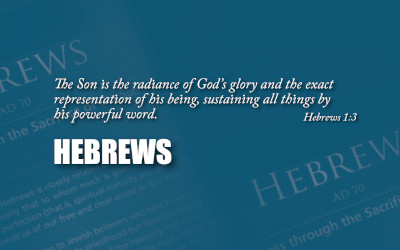Hebrews 7:1-28
The Melchizedek priesthood. Perfection. Change of law. The altar. Law is useless.
(Bấm vào đây để đọc tiếng Việt)
 "The Priestly Order of Melchizedek
"The Priestly Order of Melchizedek
1Now this Melchizedek, king of Salem, priest of the most high God, met Abraham as he was returning from defeating the kings and blessed him. 2To him also Abraham apportioned a tithe of everything. His name first means king of righteousness, then king of Salem, that is, king of peace. 3Without father, without mother, without genealogy, he has neither beginning of days nor end of life but is like the son of God, and he remains a priest for all time. 4But see how great he must be, if Abraham the patriarch gave him a tithe of his plunder. 5And those of the sons of Levi who receive the priestly office have authorization according to the law to collect a tithe from the people, that is, from their fellow countrymen, although they too are descendants of Abraham. 6But Melchizedek who does not share their ancestry collected a tithe from Abraham and blessed the one who possessed the promise. 7Now without dispute the inferior is blessed by the superior, 8and in one case tithes are received by mortal men, while in the other by him who is affirmed to be alive. 9And it could be said that Levi himself, who receives tithes, paid a tithe through Abraham. 10For he was still in his ancestor Abraham’s loins when Melchizedek met him.
Jesus Compared to Melchizedek
11So if perfection had in fact been possible through the Levitical priesthood – for on that basis the people received the law – what further need would there have been for another priest to arise, said to be in the order of Melchizedek and not in Aaron’s order? 12For when the priesthood changes, a change in the law must come as well. 13Yet the one these things are spoken about belongs to a different tribe, and no one from that tribe has ever officiated at the altar. 14For it is clear that our Lord is descended from Judah, yet Moses said nothing about priests in connection with that tribe. 15And this is even clearer if another priest arises in the likeness of Melchizedek, 16who has become a priest not by a legal regulation about physical descent but by the power of an indestructible life. 17For here is the testimony about him: “You are a priest forever in the order of Melchizedek.” 18On the one hand a former command is set aside because it is weak and useless, 19for the law made nothing perfect. On the other hand a better hope is introduced, through which we draw near to God. 20And since this was not done without a sworn affirmation – for the others have become priests without a sworn affirmation, 21but Jesus did so with a sworn affirmation by the one who said to him, “The Lord has sworn and will not change his mind, ‘You are a priest forever ’” – 22accordingly Jesus has become the guarantee of a better covenant. 23And the others who became priests were numerous, because death prevented them from continuing in office, 24but he holds his priesthood permanently since he lives forever. 25So he is able to save completely those who come to God through him, because he always lives to intercede for them. 26For it is indeed fitting for us to have such a high priest: holy, innocent, undefiled, separate from sinners, and exalted above the heavens. 27He has no need to do every day what those priests do, to offer sacrifices first for their own sins and then for the sins of the people, since he did this in offering himself once for all. 28For the law appoints as high priests men subject to weakness, but the word of solemn affirmation that came after the law appoints a son made perfect forever. (Hebrews 7:1-28)
THE MELCHIZEDEK PRIESTHOOD
“1Now this Melchizedek, king of Salem, priest of the most high God, met Abraham as he was returning from defeating the kings and blessed him. 2To him also Abraham apportioned a tithe of everything. His name first means king of righteousness, then king of Salem, that is, king of peace. 3Without father, without mother, without genealogy, he has neither beginning of days nor end of life but is like the son of God, and he remains a priest for all time. 4But see how great he must be, if Abraham the patriarch gave him a tithe of his plunder. 5And those of the sons of Levi who receive the priestly office have authorization according to the law to collect a tithe from the people, that is, from their fellow countrymen, although they too are descendants of Abraham. 6But Melchizedek who does not share their ancestry collected a tithe from Abraham and blessed the one who possessed the promise. 7Now without dispute the inferior is blessed by the superior, 8and in one case tithes are received by mortal men, while in the other by him who is affirmed to be alive. 9And it could be said that Levi himself, who receives tithes, paid a tithe through Abraham. 10For he was still in his ancestor Abraham’s loins when Melchizedek met him.” (Hebrews 7:1-10)
Hebrews 7:1-10 discusses the significance of Melchizedek, a mysterious figure from the Old Testament, and his connection to Jesus Christ. In this passage, Melchizedek is portrayed as a “king of righteousness” and “king of peace” who has no recorded genealogy, which sets him apart as a unique and enduring priest. The passage points out that even Abraham, the forefather of the Israelites, paid tithes to Melchizedek, indicating his superiority.
The key point of this passage is that the priesthood of Melchizedek is greater than the Levitical priesthood established under the Old Covenant. This is significant because Jesus is considered a high priest according to the order of Melchizedek, and His priesthood surpasses that of the Levites. The passage suggests that the change in the priesthood, from the Levitical to the Melchizedekian, also necessitates a change in the law, emphasizing the superiority and eternal nature of Christ’s priesthood.
PERFECTION
“11So if perfection had in fact been possible through the Levitical priesthood – for on that basis the people received the law – what further need would there have been for another priest to arise, said to be in the order of Melchizedek and not in Aaron’s order?” (Hebrews 7:11)
In Matthew 5:48, Jesus conveyed the message: “So then, be perfect, as your heavenly Father is perfect.” However, achieving this level of perfection is unattainable through the Levitical priesthood. Consequently, the necessity arises for another priest in the order of Melchizedek to make this perfection attainable.
Christians should firmly grasp the concept that they must attain perfection to enter God’s kingdom, and they should recognize that such perfection cannot be reached through a covenant based on law.
CHANGE OF LAW
“12For when the priesthood changes, a change in the law must come as well.” (Hebrews 7:12)
Romans 8:2 discusses the transformation in the concept of law as follows:
For the law of the life-giving Spirit in Christ Jesus has set you free from the law of sin and death. (Romans 8:2)
However, many Christians may not fully grasp the need for a fundamental shift from the Old Covenant to the New Covenant. They often perceive the New Covenant as merely an extension of the Old, which is a misconception.
THE ALTAR
“13Yet the one these things are spoken about belongs to a different tribe, and no one from that tribe has ever officiated at the altar. 14For it is clear that our Lord is descended from Judah, yet Moses said nothing about priests in connection with that tribe.” (Hebrews 7:13-14)
Due to Jesus’ lineage from the tribe of Judah, he would not have been recognized as a priest according to the Mosaic law. Additionally, he would not have had any involvement with the altar, as the practice of animal sacrifice was terminated after his crucifixion. Following his death on the cross, there was no longer a need for sin offerings, as he had already made a propitiation for all of humanity’s sins, once and for all.
LAW IS USELESS
“15And this is even clearer if another priest arises in the likeness of Melchizedek, 16who has become a priest not by a legal regulation about physical descent but by the power of an indestructible life. 17For here is the testimony about him: “You are a priest forever in the order of Melchizedek.” 18On the one hand a former command is set aside because it is weak and useless, 19for the law made nothing perfect. On the other hand a better hope is introduced, through which we draw near to God. 20And since this was not done without a sworn affirmation – for the others have become priests without a sworn affirmation, 21but Jesus did so with a sworn affirmation by the one who said to him, “The Lord has sworn and will not change his mind, ‘You are a priest forever ’” – 22accordingly Jesus has become the guarantee of a better covenant. 23And the others who became priests were numerous, because death prevented them from continuing in office, 24but he holds his priesthood permanently since he lives forever. 25So he is able to save completely those who come to God through him, because he always lives to intercede for them. 26For it is indeed fitting for us to have such a high priest: holy, innocent, undefiled, separate from sinners, and exalted above the heavens. 27He has no need to do every day what those priests do, to offer sacrifices first for their own sins and then for the sins of the people, since he did this in offering himself once for all. 28For the law appoints as high priests men subject to weakness, but the word of solemn affirmation that came after the law appoints a son made perfect forever.” (Hebrews 7:15-28)
I was initially drawn to Christianity by verses like John 3:16, which begins with “For God so loved the world…,” but after becoming a believer, I found myself adhering to the law as a guiding principle in my relationship with God. It seemed like God would only accept me if I met certain requirements, and I became well-versed in numerous Old Testament verses that emphasized obedience and the potential for rewards.
I don’t recall ever being taught that the law is, as described in verse 18, “weak and useless” and that it “made nothing perfect.” Nevertheless, I persevered in my efforts, hoping to attain a certain level of success. I’m uncertain whether even a brief mention of this verse would have steered me in a more accurate direction.
Verses 19 and 22 introduce the idea of a “better hope” and a “better covenant,” made possible by Jesus Christ as the eternal high priest who “is able to save completely those who come to God through him, because he always lives to intercede for them.” (verse 25)
While the law may prove ineffective, Jesus represents the perfection needed to help believers “draw near to God.” (verse 25)
Nghi Nguyen
- Scripture quoted by permission. All scripture quotations, unless otherwise indicated, are taken from the NET Bible® copyright ©1996-2006 by Biblical Studies Press, L.L.C. All rights reserved.
Disclaimer: This is my own opinion on the topic, which does not necessarily reflect the church's theology, or beliefs of the individuals in it — Nghi Nguyen
